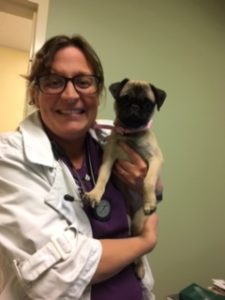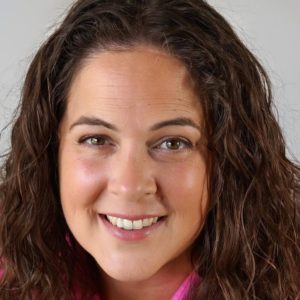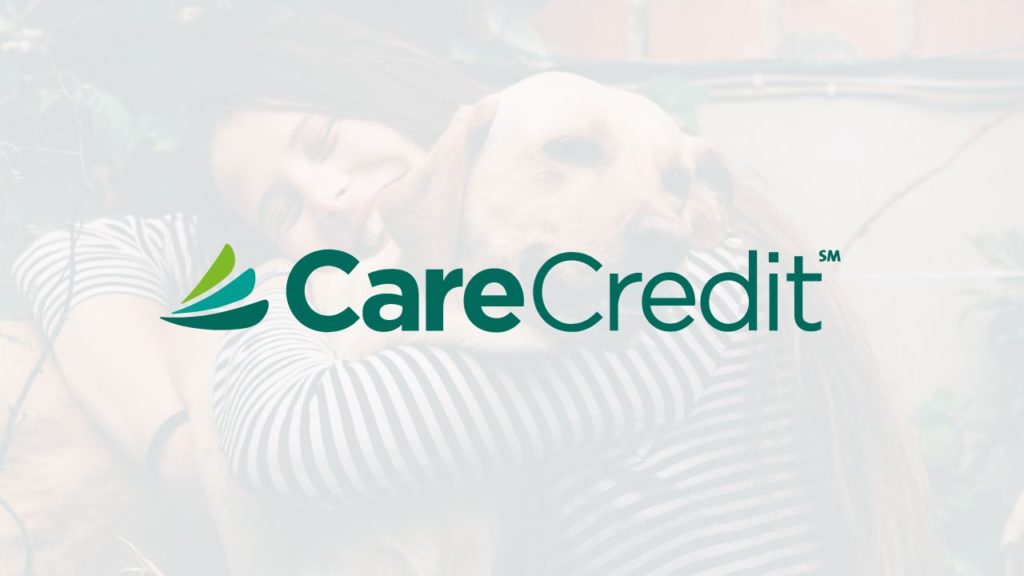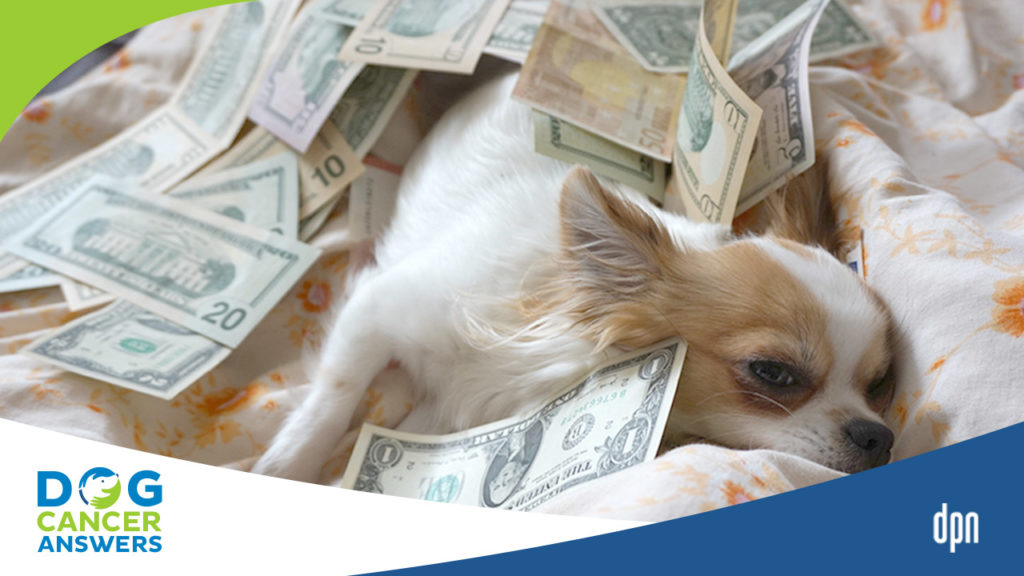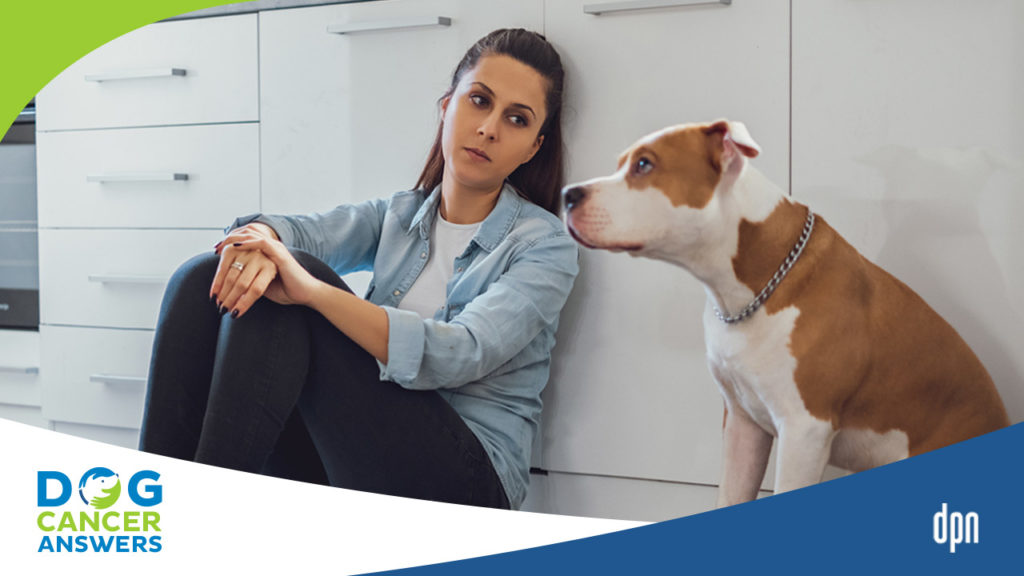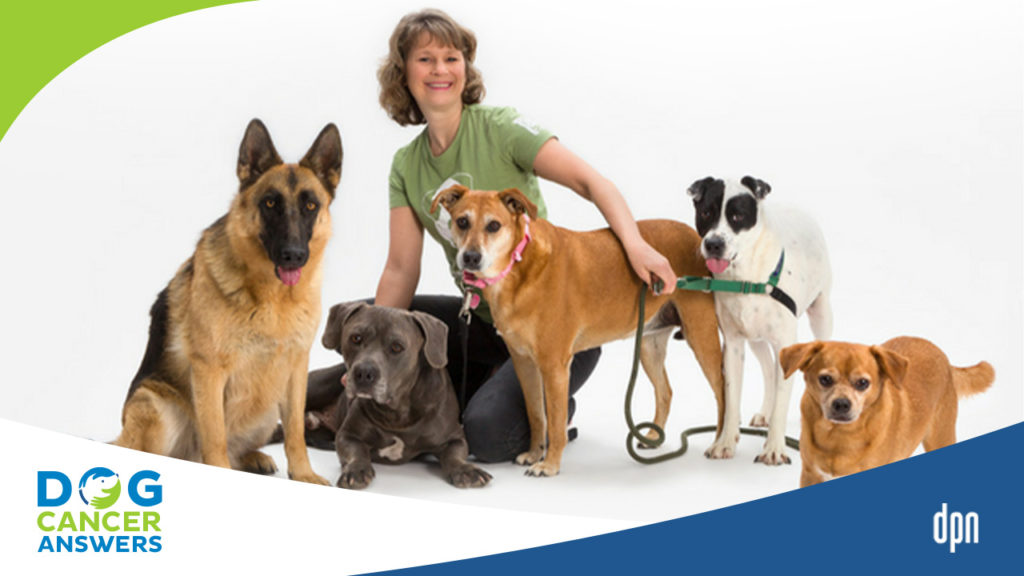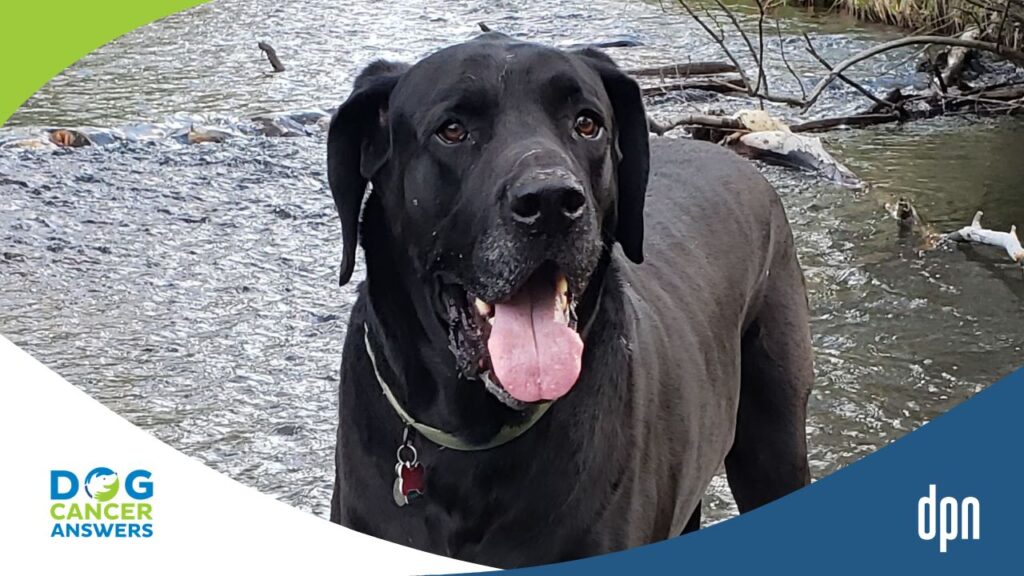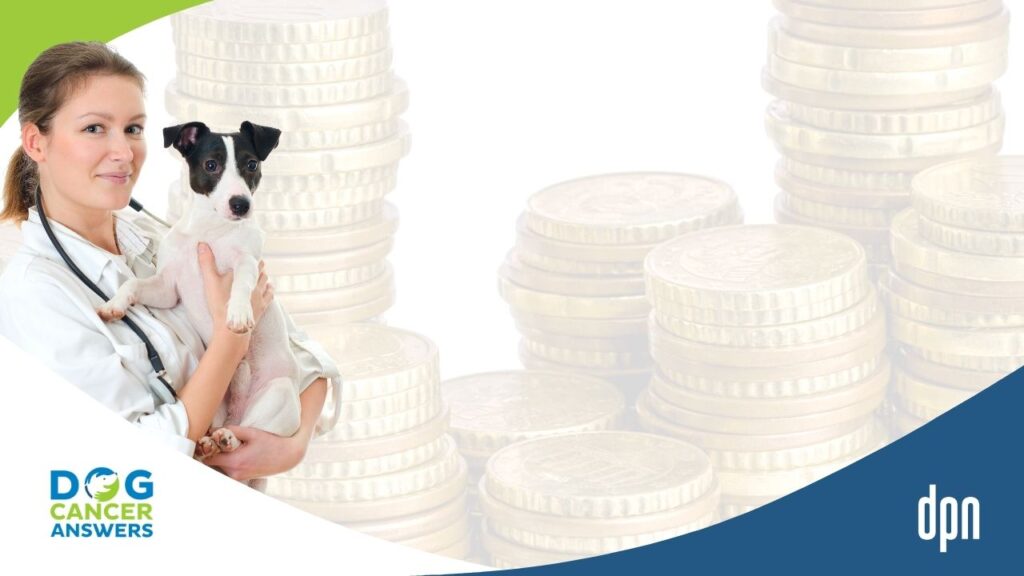EPISODE 200 | RELEASED January 23, 2023
How to Think About Dog Cancer Expenses | Dr. Lauren Barrow
Give yourself grace. That is Dr. Barrow’s top advice if you can’t afford expensive treatments for your dog’s cancer.
SHOW NOTES
Dr. Lauren Barrow is a veterinarian, dog lover, and mom to a child who had cancer. This gives her a unique perspective on the challenges of giving and receiving a cancer diagnosis, as well as the stress of making treatment decisions. Dog cancer has the extra challenge that most veterinary care has to be paid for up front, as even the few dogs that have pet health insurance are likely covered by plans that reimburse later.
Even if you are strapped for cash, you have options. Take some time to process your dog’s diagnosis before making any decisions, and work with your veterinarian to figure out the option that best meets your dog’s needs while also fitting your budget.
Remember: you can’t control or fix everything, and this isn’t your fault. No one is perfect and we live in an imperfect world. Do what you can, and give yourself permission to forgive what you can’t do.
Not One More Vet https://www.nomv.org/
[00:00:00] >> Dr. Lauren Barrow: Our whole society is built on us having things and buying things that we can’t afford. I don’t own my car, I don’t own my house, the bank does. But if I can’t afford my dog’s cancer treatments, which are out of nowhere most of the time, I feel really extra bad about that.
[00:00:21] >> Announcer: Welcome to Dog Cancer Answers, where we help you help your dog with cancer.
[00:00:28] >> Molly Jacobson: Hello, friend. Finances are one of the most difficult pieces of the dog cancer journey. Most of us have limited money to spend, even on someone as important as our dog, and cancer treatment, and even just the diagnosis, is often an expensive process.
So today on Dog Cancer Answers, we’re joined by Dr. Lauren Barrow. She’s a veterinarian in Colorado who has a really compassionate strategy for talking about money with her clients and helping them navigate these difficult decisions. Her knowledge comes not just from her experience as a veterinarian, but from a very personal part of her own life. So Dr. Barrow, thank you so much for joining us today.
[00:01:08] >> Dr. Lauren Barrow: Thank you for having me. It should be fun.
[00:01:11] >> Molly Jacobson: I think so. Before we started, you mentioned that you’re sometimes known as Dr. Mom, and you are literally coming to us from a place where you are a doctor and a mom. And so tell me where you’re, where you’re recording from today, ’cause you’re not where most people probably imagine you are.
[00:01:28] >> Dr. Lauren Barrow: Yeah. I did not plan on being here today for this. Um, about, I guess 10 days ago, my son, who is medically fragile – and he has a lot of medical problems secondary to a brain tumor from when he was a baby – he started in with a bloody nose on, what was that, Friday 12th or something like that, about 10 days ago.
And he started having a nose bleed and it wouldn’t stop. I was actually at work, but my husband and his nurse brought him into the emergency room and um, they got his nose to bleed, but he started having seizures and it turned out he was bleeding inside of his brain as well. So he has a shunt from some previous medical work with his brain.
So they got in there last week and repaired it. So now he’s currently intubated on the ventilator. They’re doing one more MRI and then if everything looks okay, they’re gonna go ahead and extubate him today. So, we’re just doing that thing that we do sometimes where we live our lives in the hospital. And we’ve done that for about six years with him.
But you know, he’s my little buddy and we work hard for him. But it’s, uh, it makes me have a personal relationship with cancer because this all started with cancer. And so from a personal standpoint and a mother’s standpoint, and even a medical standpoint, ’cause I, I know what they’re talking about when they’re, you know, talking to each other about his stuff.
I hate cancer. I want it to stop, go away, because it’s, it’s just, it changes things and it’s an emotional thing and it affects the whole family, so.
[00:03:05] >> Molly Jacobson: Right.
[00:03:05] >> Dr. Lauren Barrow: That’s the personal part of cancer with me and it’s a everyday thing in my house with people and dogs.
[00:03:13] >> Molly Jacobson: That’s why I wanted to start there because I think it’s important that our listeners know that the reason you’re here is not just because you’re a veterinarian, which you are, you’re a very good veterinarian.
[00:03:23] >> Dr. Lauren Barrow: Oh, thank you.
[00:03:24] >> Molly Jacobson: But you also are someone who really understands what it’s like to care for a helpless creature who has cancer, not just a dog, but your own son. And you also understand the topic of today’s talk, where we’re gonna talk about finances. We’re gonna talk about finances from the client’s point of view.
Like if I’m treating cancer, what are my concerns and what am I thinking about budget and how do I finance it. But we’re also gonna talk about it from your point of view on the other side of the table. And you are literally uniquely qualified to talk about this because you understand as not just a pet parent, but a human parent, all of the factors that go into this. So you tell me-
[00:04:07] >> Dr. Lauren Barrow: Yeah. Unfortunately, that’s right.
[00:04:09] >> Molly Jacobson: Yeah. Where do you wanna start? What’s the most important thing for our listeners to know?
[00:04:13] >> Dr. Lauren Barrow: Honestly, I think the most important thing is to give yourself some grace. Whether that’s because your dog got cancer, and I’ve had people try to blame themselves, you know, like, did I feed them the wrong food, did, I gave them tap water instead of filtered water, or you know, whatever that may be. Or sometimes they’ll blame others, but people blame themselves a lot. And then when you add finances on top of that, now you’re doubly blaming yourself and I think sometimes social media and our society play into that.
But also you gotta give yourself a break because it’s really hard and you love your dog or you wouldn’t be listening to this. You know, I’m just like, I love my kid, I love my dogs too, but you are affected also, and you have to, I think as a veterinarian, I’ve gotten really good at compartmentalizing things with my son, things with work, things with, you know, my other kids or husband or whatever.
But you, you really have to stop and realize, I can’t control everything. I can’t fix everything. And also, it’s not all your fault. It’s not my fault. And all you can do is the best you can do, and sometimes it’s one day at a time. If you can start with that, you can get up every time you fall down and just sort of one foot in front of the other. I think that’s the biggest thing, which doesn’t have a lot to do with money, but give yourself a break and do the best you can. Some grace.
[00:05:41] >> Molly Jacobson: I think you’re right. I wanted to pick up on something you said about there’s all of the self blame about the fact of cancer having come into the family and into your dog or your child to begin with. Then there’s all of this blame that has to do with, I mean, a lot of us suffer from financial shame, really.
I mean, I grew up in a family where we weren’t destitute, but we did not have the money that other people in our town had and sometimes there were moments of food insecurity and it was, looking back, I realize how much of a knife’s edge we were on, more than I understood as a child. And I think about all of the things that I internalized from that – I have a lot of financial shame, if I can’t afford something there’s something wrong with me.
[00:06:27] >> Dr. Lauren Barrow: Right.
[00:06:28] >> Molly Jacobson: So can you talk a little bit about that from your own perspective?
[00:06:32] >> Dr. Lauren Barrow: Well, I started out that way too. Um, when I had my daughter, I remember we, we had one car. So my husband would go to work and I was home with her, and this was before vet schoo*l*, but I pushed her in the stroller down to King Soopers and I had a $20 bill. And I would add it up in my head, I knew how much diapers and food and stuff I could get with that $20 bill and then we walked home. And I had two dogs, so I-
[00:06:59] >> Molly Jacobson: That’s a lot-
[00:06:59] >> Dr. Lauren Barrow: It’s-
[00:07:00] >> Molly Jacobson: -of responsibility.
[00:07:01] >> Dr. Lauren Barrow: I was a vet assistant and stuff, so it was like I loved animals and I think it’s sort of not fair to put that on people. I mean, in a perfect world, and what everyone agrees with, I think, is that you shouldn’t get a dog if you can’t afford it. But I also think that realistically that’s not gonna happen. Maybe it should happen, but it doesn’t. And our whole society is built on us having things and buying things that we can’t afford. I don’t own my-
[00:07:30] >> Molly Jacobson: That’s true.
[00:07:30] >> Dr. Lauren Barrow: I don’t own my car. I don’t own my house.
[00:07:32] >> Molly Jacobson: Right.
[00:07:33] >> Dr. Lauren Barrow: The bank does. But if I can’t afford my dog’s cancer treatments, which are out of nowhere most of the time, I feel really extra bad about that. And that’s because there’s emotional things attached to that. But I guess what I’m saying is in a perfect world, yes, don’t get a car, don’t get a dog, don’t have children, don’t do anything. Don’t go on vacation, don’t get a credit card, don’t do anything unless you can afford it. And you do have a child or a dog or something with that has pain and a life that you’re in charge of.
But there’s things you can still do. Because a lot of people will find themselves in that situation. I was actually doing some reading and I found that – it depends on what source you find in what year, but I think approximately, half of the households in the United States have at least one dog.
[00:08:25] >> Molly Jacobson: Yep.
[00:08:25] >> Dr. Lauren Barrow: And then if you add in cats and stuff, it’s, it goes way up. But I found the statistic about 69% of adult Americans have less than a thousand dollars in their bank account, in their savings account.
[00:08:36] >> Molly Jacobson: That’s right.
[00:08:37] >> Dr. Lauren Barrow: And that is a lot of overlap.
[00:08:39] >> Molly Jacobson: Right.
[00:08:39] >> Dr. Lauren Barrow: And you know, if you’re listening to this and you have a chance to go back in time, or your dog doesn’t have cancer yet, go start a savings account or get insurance or something. But, if you’re listening to this, you’re probably already in that situation, so you can’t do anything but give yourself grace and go forward.
[00:08:58] >> Molly Jacobson: Right.
[00:08:58] >> Dr. Lauren Barrow: Because it is what it is and crappy things happen. And now we look forward and we deal and we pick ourselves up and we do what we can for our dog ’cause we love him.
[00:09:09] >> Molly Jacobson: Right. I agree with you. This is what the message from society is, well, if you can’t afford it, don’t get it. On the other hand, there are people who, I mean, I can think of four people in my neighborhood who if they did not have their dog, they would be alone all the time. They would be lonely. Like, I am lonely without my dogs. Right? Like-
[00:09:30] >> Dr. Lauren Barrow: Yeah. Yeah.
[00:09:30] >> Molly Jacobson: I’ve lost two dogs in the last year, we’re currently a dogless household, I’m lonely.
[00:09:35] >> Dr. Lauren Barrow: Yeah.
[00:09:35] >> Molly Jacobson: That’s a good reason to give a dog who needs and wants companionship as well a home, even if it’s not the perfect home.
[00:09:44] >> Dr. Lauren Barrow: Sure.
[00:09:45] >> Molly Jacobson: Right. So you’re saying basically, hey, the world isn’t perfect.
[00:09:48] >> Dr. Lauren Barrow: Yeah. And that’s okay. Let’s do our best. What do you say? Nobody’s perfect and there’s a whole lot of room to be good and helpful and not be perfect, and that includes money.
[00:10:03] >> Molly Jacobson: Right. So let me ask you a question that, it might sound challenging to you as a veterinarian. Are you just out to get my money? Do you just wanna treat my dog’s cancer because it’ll make you money? Like how much money are vets actually making off of cancer treatments?
[00:10:20] >> Dr. Lauren Barrow: Right.
[00:10:21] >> Molly Jacobson: Because this is something I hear all the time. Are vets be- millionaires? Are they all making a ton of money and are they charging us over?
[00:10:29] >> Dr. Lauren Barrow: Yeah. So the first thing that will pop into any veterinarian’s mind is those darn student loans. Which is a major hot topic right now that I am not gonna touch because everyone’s all crazy about it. But vet school is super expensive and you can’t – no, that’s not true. Most people need to take out loans to go to vet school.
[00:10:50] >> Molly Jacobson: Okay.
[00:10:50] >> Dr. Lauren Barrow: I have a pretty smart friend who joined the Army and the Army paid for it, but a lot of times, a lot of us have student loans that are huge.
[00:10:57] >> Molly Jacobson: Like what’s huge? What are the student loans?
[00:11:01] >> Dr. Lauren Barrow: Mine’s in the mid $250,000s.
[00:11:02] >> Molly Jacobson: Oh my word.
[00:11:03] >> Dr. Lauren Barrow: Yeah.
[00:11:03] >> Molly Jacobson: So it’s like going to medical school.
[00:11:05] >> Dr. Lauren Barrow: Oh yeah. It is. Only I promise I’m not getting it paid as much as those doctors. And in this country too, we don’t have the insurance system, you know, people pay out of pocket. But we have a lot of the same technology, equipment, a lot of the same things that we use with human medicine too. So.
[00:11:26] >> Molly Jacobson: You mean like x-ray machines and CAT scans and ultrasounds.
[00:11:29] >> Dr. Lauren Barrow: The x-ray machines and gloves and the electric bill. And you gotta pay your staff. And that’s a whole nother thing is that we don’t pay our technicians and assistants nearly enough either. They’re the front lines here doing all, all the hard work and they get paid peanuts. So we’re, almost all of us, I’d say, if not all of us, in it for the love of animals.
If, if we were in it for the money, I would’ve gone to medical school. Sometimes I wonder why didn’t I just go to medical school? I could like boss the PICU team around here for my son. But I am, I’m doing it because I, I love the animals and if you break down the bills of it – which I don’t wanna bore anybody with, and honestly I do my best to just ignore that ’cause I’m, I’m not the boss at my place, I don’t have to worry about that – it’s upside down a little bit. And it’s very hurtful when, it’s very hurtful when people accuse us of, of looking for money. And that’s the farthest from any of our minds. I mean, we gotta feed our kids. We gotta, we have to get the same gas that you do. We go to the store and buy groceries too.
So it’s our job, but it’s also a job that we picked that we worked really hard on for a really long time, and a lot of us paid a lot of money to do that. And I’m not complaining, I chose this way and I, it’s a good gig, I’m happy I did it, but it’s, I do wish people would kind of back off. Also, we need grace, we’re doing our best also. We’re humans and there’s, there’s a lot of problems with suicide and things with veterinarians and, and that’s a whole nother subject, but just give yourself grace, give us grace. That would be-
[00:13:12] >> Molly Jacobson: Yeah. We’ll put a link in the show notes to Not One More Vet, which our friend Katie Berlin who is on the show frequently started, which is the suicide help.
[00:13:22] >> Dr. Lauren Barrow: They’re amazing.
[00:13:23] >> Molly Jacobson: ‘Cause it’s a real problem for veterinarians.
[00:13:26] >> Dr. Lauren Barrow: It really is.
[00:13:27] >> Molly Jacobson: I don’t wanna talk too much about that, but can you just tell me a little bit about like what goes through your mind when you’re giving a cancer diagnosis? Like how is that for you as a human being and a veterinarian to tell someone about their dog’s cancer?
[00:13:41] >> Dr. Lauren Barrow: It’s really hard. And I feel a lot of responsibility for that, because from a personal standpoint, I remember the exact second that they told me about my son’s brain tumor. And that moment was seven years ago and it’s ingrained forever. And so I’m giving essentially that moment to these people. I’d say at least half the time it’s a surprise. They just came in for vaccines or something or, and I found like big lymph nodes or, and it’s a bump on their head.
So I take a lot of time to choose my words carefully, give them some space to kind of think about it, ask them if they have any questions yet, and just kind of, I guess, show my, my empathy and my hurt about it too, ’cause I get that like way deep how that just, it’s a moment. And I don’t like being the one to give that to them. But I also want to take the responsibility to do it as kindly and forthrightly as possible.
And I try to be realistic and optimistic and just like, Hey, this sucks so much and I get it, but we’re gonna, we’re gonna move forward and we’re gonna make a plan and we’re going to, again, do our best. And that’s sort of how I approach it, especially lately.
[00:15:06] >> Molly Jacobson: So how does money usually come up? ‘Cause I imagine it comes up pretty quickly most of the time, right?
[00:15:12] >> Dr. Lauren Barrow: Yeah, it does. And a lot of it is because I think a lot of people already kind of are, are worried about how much a vet bill is just period.
[00:15:22] >> Molly Jacobson: Yeah.
[00:15:22] >> Dr. Lauren Barrow: Just because it, it’s out of pocket for most people. And so that’s a, something that they’re saving up for, or they just know like every February they have to do vaccines. So to hear, oh my God, my dog has cancer, a lot of people go to finances fairly quickly. Maybe the first thing, maybe after my dog’s gonna die, is it hurting, you know, and then how am I gonna pay for this.
So I always start with the approach of if they bring up the money thing. I won’t bring up the money thing. They almost always do first because we’ll get to that. If they need to process the, the bomb I just dropped on their lives, then we should do that first. But if they bring up the money, then – “I don’t have any money” means a lot of different things to different people.
You know, to some people they’ve said that to me and then they go and they, they scrape up a couple thousand bucks pretty fast. And some people, “I don’t have any money” means I was gonna put today’s appointment on a credit card and then I was gonna go to the food bank after this and I have to walk there ’cause I don’t have a car. You know?
And there’s everything in between, but there’s a whole wide variety. So I will usually, and I do this with other diagnoses too, but cancer’s sort of that special, you hear cancer and it stabs you in the heart.
[00:16:40] >> Molly Jacobson: Yeah.
[00:16:40] >> Dr. Lauren Barrow: No matter what you’re talking about.
[00:16:42] >> Molly Jacobson: True.
[00:16:42] >> Dr. Lauren Barrow: I will usually start with the, we have a range of what we can do here, you know? And at one end is, if you can go to the oncologist, I think you should. And if they’re worried about money, they’ll always ask me how much that is, and I don’t always know exactly, because it depends on the cancer and what they wanna do. But if you can go to the oncologist, they are the ones that are gonna know what the different options are for treatment.
They can confirm my diagnosis, ’cause sometimes I haven’t done much more than this, you know, touching lymph nodes. So they can confirm diagnoses. They can stage, which is find out where else it is. They can let you know if there’s trials. Sometimes there’s trials. Here where I am in Colorado, we’re pretty close to Colorado State University, and they have a pretty big cancer vet school.
They’re amazing. But they have trials all the time. So if you can go to the oncologist, I always encourage people to try that. And don’t say no yet, sleep on it. You know, call them, see what the appointment schedule looks like. You don’t have to do everything they say. They can also present kind of a, a range of options like I’m doing right now.
It’s not all or nothing. It’s not sell your house. Go see what they have to say, and if you can’t do it or you don’t want to – ’cause sometimes it’s not even money, you know, sometimes it’s, it’s other factors – then come back to me and we’re gonna figure this out and we’ll talk about what we need to do. But that’s number one. If you can, go do that.
And then I just sort of go down from there. Just pretty much depends on what kind of cancer we’re talking about, how far along we are, and their budget, and you know, where are they with their lives too. Because it’s a very personal decision.
[00:18:26] >> Molly Jacobson: It’s extremely personal. Does knowing their budget, like literally having a hard number to work with, does that help you help them make treatment decisions?
[00:18:37] >> Dr. Lauren Barrow: To some extent. I think a lot of people don’t have that number, and if they do, I’ve found that it changes, you know, like the, uh, early twenties kid that’s like, actually I just called my mom and she’s gonna help me, or, you know, I think a lot of people that changes, but to have a number to start with is good. I work in a day practice clinic. We’ve got the basic stuff. I don’t have an MRI, I don’t have an orthopedic surgeon, I don’t have an oncologist, I don’t have an oxygen machine.
I have basic blood work and x-ray machine and we just got an ultrasound that we’re working on learning how to use. And then I’ve got drugs. I’ve got access to drugs, you know, the steroids and things. So you almost can’t, you know, spend too much money at my clinic. The oncologists have the fancy cool stuff. So let’s say you’ve got 20 bucks. All right, that’ll get you some steroids right there. And if you got a couple hundred, then if it’s this kind of cancer, it might be worth it to get them x-rays, make sure it hasn’t spread. If it’s that kind of cancer, it might be worth it to do a mass removal, even if we can’t send it in. You know, it depends, it depends. Totally depends. But a place to start is helpful.
[00:19:48] >> Molly Jacobson: That’s a good place for us to take a break. So hold on while we pay the meter. And then when we come back, I wanna continue our discussion.
And we’re back with Dr. Barrow, Dr. Lauren Barrow, Dr. Lauren, Dr. Mom. I think when you first get the diagnosis, the shock overtakes people. They often kind of check out for the rest of that. Like they can’t really think. It’s the second, or it’s the next day. It’s the second appointment, or in the middle of the night, their brain kicks back into gear and they’re able to start thinking about these things.
If that’s happening to a listener where they’ve gotten over the initial shock and now they’re able to formulate some questions, what is the best way for them to approach their vet? Should they make another appointment? Should they call and say, can I send an email with a lot of questions that I have? Like, what do you suggest for our listeners in terms of handling this topic of money without, I guess without shame, like how to offer themselves grace in those next steps once they’re over the shock?
[00:21:01] >> Dr. Lauren Barrow: Yeah, ’cause I, I think you’re right. I think people, yeah, they freak out. A lot of people will kind of shut down and oh my God, this is awful, and they need to talk to their family. They need to go home. They need to sleep on it. And so I will encourage them to do that. And I’ve said that before. I know I just dropped a bomb on your head and you need to process this. So I have learned over the years to send them with some articles and some places to go read and give them permission to not make any decisions right now.
Here’s the number for the oncologist if you and your family tonight or tomorrow decide to do that. But I think as far as what to do with your, with your own vet, I think it depends on the vet. Like for me, I’m a very email oriented person, and so I am more than happy to have them send me whatever questions they have, especially after they’re reading articles and you know, have all of these different things. So, and I like that too, because then you can copy and paste it, put it in the file, someone else can read it if they need to.
I can send them more articles about different things. So I like email. I also tend to be like super busy and we’re, all of us are overbooked. So some vets might prefer an appointment, and it might be hard to get one, sometimes that’s more respectful of their time. I know some other vets that like the phone and they hate the email and they’ll, they’ll say, Hey, let me know when I can call you.
So I think it depends on the vet, but if you ask me, I love the email. Copy and pasting is my favorite. That’s, it helps me keep track of so many things in my life, so.
[00:22:31] >> Molly Jacobson: Right.
[00:22:31] >> Dr. Lauren Barrow: Um, and sometimes also I think people process things better when they read them. Hearing things is a different part of your brain, you know, than reading sometimes. So hearing it from me, hearing it on the podcast, and then reading something, reading a blog, reading an article, and then asking questions based on that, I think that’ll help you get around all of those mental blocks. For money, for pain reasons, for, you know, what is this technical term you’re talking about, like all of that stuff, money included.
[00:22:59] >> Molly Jacobson: I recently talked to Dr. David Vail at the University of Wisconsin, an oncologist. He put it very simply. He said, your general practice vet is an excellent screener for cancer, and some of them see a lot of cancer and are in an area where there aren’t referral oncologists, and so they can competently manage a cancer case. But they’re not trained in the day-to-day management of oncology.
So if you think of them as a screener and the oncologist is a specialist, just like your own general practitioner is a screener, like, my doctor’s not gonna look at a mole that’s suspicious and say, let me cut that out for you, right? Like, she’s gonna say, go see a dermatologist.
[00:23:39] >> Dr. Lauren Barrow: Right.
[00:23:39] >> Molly Jacobson: Who might then refer me to an oncologist, depending on what they see, right?
[00:23:43] >> Dr. Lauren Barrow: On down the line. Yeah.
[00:23:45] >> Molly Jacobson: Exactly. And that sort of, it’s not a hierarchy, it’s just what people are good at, what they’re trained for. So my question is, given that you guys aren’t always in the best position to assess all of the treatment options or even stage cancer, what is your advice for your colleagues who are giving this diagnosis so that they can be as sensitive as possible to those realities and also the fact that people are immediately starting to think about money?
[00:24:18] >> Dr. Lauren Barrow: Yeah. And it’s kind of that situation, like I was saying before, if you can involve an oncologist, that’s gonna be your best bet. And you’re right, sometimes it’s not money, sometimes it’s they live out in the boonies somewhere.
[00:24:30] >> Molly Jacobson: Yeah.
[00:24:30] >> Dr. Lauren Barrow: The one, one thing that’s pretty cool about veterinary medicine, depending on how you look at it is, as a veterinarian, legally I’m licensed to learn something new that maybe I didn’t do before, you know, with a, a different medication or something.
[00:24:45] >> Molly Jacobson: Right.
[00:24:46] >> Dr. Lauren Barrow: You know, so if any of my colleagues are ambitious enough to try and manage that beyond where they’re already comfortable, then there’s awesome sources out there for education and CE and, and things like that. And I think, I think we all know that. And I think most of us are pretty secure in our limits and what we feel comfortable doing. And, you know like I haven’t done surgery in a long time, but when I did do surgery, I was okay with amputations but I wasn’t okay with like a limb spare surgery.
So you know, ask your vet, my colleagues, like, where are your limits, what do you feel comfortable doing? And I may be going out on a limb a little bit, but I think we’re all pretty good at managing pain.
[00:25:31] >> Molly Jacobson: Yes.
[00:25:31] >> Dr. Lauren Barrow: Managing other supportive care things.
[00:25:34] >> Molly Jacobson: Of course.
[00:25:34] >> Dr. Lauren Barrow: Like if you need fluids, if you need anti-emetics, anti-nausea medication, you know, those kind of things. So we screen it, but a lot of times they either come back to us – so like I do live in an urban area, so I work a lot with the oncologists, and they have the fancy stuff over there, but then when they just need a CBC, you know, a blood test or something, or x-rays, just chest x-rays, they’ll come back to me, and then I’ll send ’em back and forth. So sometimes it’s not just one of us.
[00:26:04] >> Molly Jacobson: Right.
[00:26:04] >> Dr. Lauren Barrow: And there’s a lot of flexibility and a lot of variation in veterinary medicine. A lot of variation in cost too. I mean, something in urban Denver is gonna cost a lot different from everywhere else, you know, everything varies. So I kind of see myself as a, a partner too with the owner. You know, what do you, what do you need? Do you need to talk about euthanasia? Do you need to talk about pain medication? Do you need to ask me why this costs so much at the oncologist and what this is, like, what is an MRI, why do they want all this money for an MRI?
I can help you. I mean, I don’t have that much time, I don’t have endless time, but I have enough time to help you, especially if you let me do emails. But it’s confusing and it’s scary. So I think being flexible and seeing what’s available, what are you comfortable with, and just having an open dialogue with the vet and the client is probably the best scenario that you can come up with.
And giving each other grace, again, and yourselves, and you know, realizing this is hard for everybody. This is hard on us too. We’re happy to do it, but it’s hard.
[00:27:09] >> Molly Jacobson: Yeah.
[00:27:10] >> Dr. Lauren Barrow: And we wanna help. We really, really do.
[00:27:13] >> Molly Jacobson: If we had magic wands-
[00:27:15] >> Dr. Lauren Barrow: Yeah.
[00:27:15] >> Molly Jacobson: -to give to veterinarians, they might wave it over that tumor.
[00:27:19] >> Dr. Lauren Barrow: I would take it. I would definitely take it.
[00:27:21] >> Molly Jacobson: Right.
[00:27:22] >> Dr. Lauren Barrow: Or a crystal ball. That’s the other thing that sometimes I wish I had. Both of those and I would be so set.
[00:27:27] >> Molly Jacobson: So you could be called Dr. Fairy Godmother.
[00:27:31] >> Dr. Lauren Barrow: Yes. Oh, that would be fun. I could do that. I could wear a sparkly dress all day long. Um, can I tell you something my friend said?
[00:27:38] >> Molly Jacobson: Yes, please.
[00:27:39] >> Dr. Lauren Barrow: I don’t think she made it up, maybe she did, she’s a genius. She’s a, a GP in Albuquerque, but she said, “I don’t save lives, I postpone death.” And I was like, oh, CeCe, that’s deep, dude, because none of us are promised-
[00:27:53] >> Molly Jacobson: Right.
[00:27:54] >> Dr. Lauren Barrow: -anything and so you take that day and you make that day the best day for that dog you can. And then you make that day the best you can for yourself, and you give yourself grace and get up and you go. There you go. That’s what you do, every day. And then tomorrow you do it again. That’s the best you can do.
[00:28:10] >> Molly Jacobson: Well Dr. Mom, Dr. Lauren, Dr. Barrow, thank you so much for this conversation. I hope that everything goes well with your son. I can’t tell you how much it means to me that you were able to and willing to join us today, given what’s going on with your family. And I also want to just make a note for our listeners that that’s what it takes sometimes to get through cancer, right? We are more resourceful sometimes than we understand, than we think we are.
[00:28:40] >> Dr. Lauren Barrow: Well, and I think when you have to face something hard for someone else on someone else’s behalf, you find a strength that you didn’t really know that you had.
[00:28:53] >> Molly Jacobson: And thank you listener for joining us today and taking part in this very important discussion. I don’t think I could repeat Dr. Lauren’s advice too often to give yourself grace and give your vet grace and give, I don’t know, your dog grace and everybody in your life grace, because you’ve gone through one of those before and after moments.
One of those moments that it’d be wonderful if we could avoid, but most of us can’t, where our life changes and it changes permanently. And we can look back at a time and say, my life was different before that moment and it’s never been the same since. And when we go through those times and we deal with the aftermath of those before and after moments, we require grace. And sometimes we’re the only ones who can give it to ourselves.
As Dr. Lauren pointed out, not just as a veterinarian who helps people’s dogs with cancer, but also as a mom to a child with a brain tumor, it’s really important to remember that sometimes it’s just day to day, it’s just one foot in front of the other, and it’s really taking the time to give yourself grace and not make it all about you and not take responsibility for things that just aren’t your responsibility. Do the best you can, and that’s all that you need to do.
If you are looking for more resources so that you can do the best you can, you can always go to dogcancer.com where we have lots of information, not only on financial resources, but also on everything else related to dog cancer. And of course join our Dog Cancer Support group. That is a wonderful place to talk through these issues and get perspectives from other people who are going through the same thing.
Sometimes when you talk to someone who’s even just six months ahead of you in the cancer journey, they can give you a perspective that you don’t have in your current mindset, and it can really help you kind of skip ahead. It’s really useful. So dogcancersupport.com, or if you want to go to Facebook directly and type Dog Cancer Support into the search bar, we’ll come right up.
Thanks again for joining us today. I’m Molly Jacobson, and from all of us here at Dog Podcast Network, I’m wishing you and your dog a warm Aloha.
[00:31:13] >> Announcer: Thank you for listening to Dog Cancer Answers. If you’d like to connect, please visit our website at dogcanceranswers.com or call our Listener Line at (808) 868-3200. And here’s a friendly reminder that you probably already know: this podcast is provided for informational and educational purposes only. It’s not meant to take the place of the advice you receive from your dog’s veterinarian.
Only veterinarians who examine your dog can give you veterinary advice or diagnose your dog’s medical condition. Your reliance on the information you hear on this podcast is solely at your own risk. If your dog has a specific health problem, contact your veterinarian. Also, please keep in mind that veterinary information can change rapidly, therefore, some information may be out of date.
Dog Cancer Answers is a presentation of Maui Media in association with Dog Podcast Network.
Hosted By
SUBSCRIBE ON YOUR FAVORITE PLATFORM
Topics
Editor's Picks
CATEGORY
